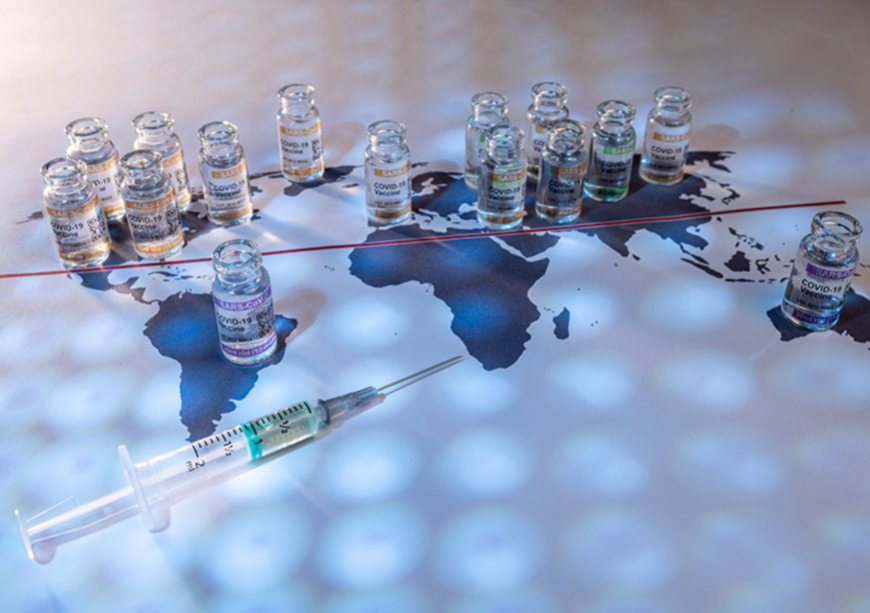-
CENTRES
Progammes & Centres
Location
As nations in the Indo-Pacific region grapple with shared health challenges, health diplomacy can serve as a pivotal force in advancing public health objectives in the region

This essay is part of the series titled: World Health Day 2024: My Health, My Right
Health diplomacy in the Indo-Pacific region represents a critical juncture where public health initiatives intersect with the intricate web of geopolitical interests and economic disparities. As nations within this vast and dynamic region grapple with shared and unique health challenges, from emerging infectious diseases to non-communicable health crises, health diplomacy can serve as a pivotal force in advancing public health objectives and ensuring equitable access to healthcare while fostering regional collaboration and mitigating the impact of outbreaks on regional stability. The emphasis on health in foreign policy discussions has been growing, as evidenced by various international declarations and resolutions, pointing towards the interdependence of health and foreign policy to achieve positive health outcomes worldwide.
The late 20th and early 21st centuries have seen significant shifts in the landscape of health diplomacy in the Indo-Pacific, driven by globalisation and the emergence of new public health threats. The region has been at the forefront of responding to global health crises, such as the SARS outbreak in 2003, the H1N1 pandemic in 2009, and more recently, the COVID-19 pandemic. These events have underscored the need for a coordinated international response and have propelled health diplomacy to the centre of geopolitical discussions. The Indo-Pacific region has also been a significant player in global health initiatives, contributing to discussions on intellectual property rights, vaccine equity, and the integration of traditional medicine into mainstream healthcare.
The region has been at the forefront of responding to global health crises, such as the SARS outbreak in 2003, the H1N1 pandemic in 2009, and more recently, the COVID-19 pandemic.
In recent years, initiatives like the Quadrilateral Security Dialogue (Quad) have expanded their focus to include health diplomacy, emphasising the strategic importance of health in foreign policy, particularly in light of the challenges posed by the COVID-19 pandemic. A key effort by the QUAD has been ensuring fair access to vaccines globally, predominantly for low- and middle-income countries facing access barriers. Initiatives like the QUAD Vaccine Partnership and support for the Global Pandemic Radar underscore the group's focus on collaborative vaccine research. Additionally, the QUAD has tackled vaccine hesitancy and misinformation through comprehensive public awareness campaigns and scientific engagement, fostering vaccine confidence. The QUAD has also sought to streamline policy alignment among member countries, advocating for global health equity and addressing issues such as vaccine supply shortages and distribution inefficiencies. Despite facing challenges such as a shortfall in promised vaccine delivery the QUAD has recalibrated its objectives towards enhancing vaccine manufacturing capacities for future health emergencies and diseases endemic to the Indo-Pacific.
As the “Global Pharmacy Depot,” producing 60 percent of the world's vaccine supply and playing a significant role in the distribution of COVID-19 vaccines globally, New Delhi’s health diplomacy also extends to advocating for equitable access to healthcare resources. Under the Vaccine Maitri programme, India leveraged its substantial pharmaceutical manufacturing capabilities, to produce vaccines not just for domestic use but for global distribution. The initiative has been pivotal in providing millions of vaccine doses to more than 90 countries across different continents, including the Indian Ocean Region, Africa, Latin America, and the Caribbean. However, the initiative also faced challenges, including domestic vaccine shortages amid surges in COVID-19 cases within India, which temporarily affected vaccine exports. Despite these hurdles, the programme adjusted and continued to contribute to global vaccine supplies, also supporting the COVAX facility to ensure a more equitable distribution of vaccines.
Under the Vaccine Maitri programme, India leveraged its substantial pharmaceutical manufacturing capabilities, to produce vaccines not just for domestic use but for global distribution.
Other countries in the Indo-Pacific, such as South Korea, Taiwan, New Zealand, and Vietnam, exemplified effective responses to the COVID-19 pandemic, showcasing the significance of early action, technological adoption, public trust, and transparent communication in managing health crises. South Korea's response was marked by extensive testing, innovative contact tracing, and the avoidance of a total lockdown, relying on its robust healthcare system and public cooperation. Taiwan's proactive measures, including stringent travel restrictions, effective public health messaging, and the integration of health and immigration data, helped keep the pandemic at bay. New Zealand took a decisive, early stance with its “go hard, go early” strategy, which included one of the strictest lockdowns and border control measures globally. Vietnam's strategy included similar measures of border closures, clear public health communication, and the use of grassroots networks for community mobilisation, which kept its case numbers and fatalities notably low despite its proximity to the pandemic's origin.
These nations demonstrated that a combination of pre-emptive border controls, public health preparedness, and the agile use of technology for testing and tracing can significantly mitigate the impact of global health threats. The pandemic underscored the interconnectedness of health and foreign policy, advocating for a collaborative, multilateral approach to future health challenges. The experiences of these Indo-Pacific countries provide a roadmap for building resilient health systems capable of responding to pandemics, emphasising the need for global solidarity, preparedness, and the willingness to learn from each other's successes and challenges.
Key Health Diplomacy Initiatives in the Indo-Pacific
| Initiative | Description | Lead Entities |
| The QUAD Vaccine Partnership | A collaborative effort by Australia, India, Japan, and the United States to expand COVID-19 vaccine manufacturing in India for distribution in the Indo-Pacific. | Australia, India, Japan, United States |
| The COVAX Facility | A global initiative ensuring equitable access to COVID-19 vaccines for all participating countries, including those in the Indo-Pacific. | GAVI, WHO, CEPI, UNICEF |
| The Indo-Pacific Strategy for Health Security | US-led strategy focusing on strengthening health systems, improving pandemic preparedness, and enhancing health security in the Indo-Pacific. | United States |
| The Asia-Pacific Strategy for Emerging Diseases and Public Health Emergencies (APSED) | The WHO-led initiative aimed at enhancing regional capacities to manage and respond to emerging diseases and public health emergencies. | World Health Organization (WHO) |
| ASEAN One Health Initiative | A collaborative approach to improve health outcomes across the region reflects the need for integrated approaches to health and development challenges in a globalized world, where the health of humans, animals, and ecosystems are inextricably linked. | Association of Southeast Asian Nations (ASEAN) |
| The Pacific Health Security Partnership | Australia's support to Pacific Island countries in strengthening health systems and responding to health emergencies, including vaccine provision. | Australia |
| The India-ASEAN Health Cooperation | Promotes health cooperation between India and ASEAN countries on traditional medicine, digital health, and health emergency response. | India, ASEAN countries |
| The Regional Emerging Diseases Intervention (REDI) Centre) | A Singapore-US joint initiative to combat emerging infectious diseases through research, training, and collaboration. | Singapore, the United States |
Source: Author’s compilation
Health diplomacy in the Indo-Pacific region is challenged by its diversity, geopolitical tensions, economic disparities, and a wide array of cross-border health threats. Political differences and historical tensions between countries can potentially hinder unified action on health issues, while economic disparities create uneven access to healthcare resources. The region's susceptibility to infectious diseases, environmental hazards, and climate change effects, combined with infrastructural and capacity disparities in healthcare systems, further complicates the implementation of cohesive health strategies.
Political differences and historical tensions between countries can potentially hinder unified action on health issues, while economic disparities create uneven access to healthcare resources.
Enhancing regional cooperation through platforms like ASEAN, WHO Regional Offices, and the Quad is vital for fostering collaborative health initiatives to address not only immediate health crises but also to ensure the long-term sustainability of health systems. Capacity-building efforts, including training for healthcare workers and investment in healthcare infrastructure and technology, are essential for uplifting weaker health systems and promoting universal health coverage. Developing regional data-sharing frameworks and early warning systems, while ensuring respect for national sovereignty and data privacy, will enable timely responses to health threats. Moreover, engaging local communities, respecting traditional health practices, and using effective communication strategies are crucial for enhancing health awareness and education across diverse populations.
Ultimately, health diplomacy in the Indo-Pacific has the potential to not only address specific health challenges but also to contribute to broader objectives of sustainable development and social inclusion. By prioritizing vulnerable populations and tackling health disparities, health diplomacy can serve as a cornerstone for regional cohesion and global health security.
Pratnashree Basu is an Associate Fellow at the Observer Research Foundation
The views expressed above belong to the author(s). ORF research and analyses now available on Telegram! Click here to access our curated content — blogs, longforms and interviews.

Pratnashree Basu is an Associate Fellow with the Strategic Studies Programme. She covers the Indo-Pacific region, with a focus on Japan’s role in the region. ...
Read More +